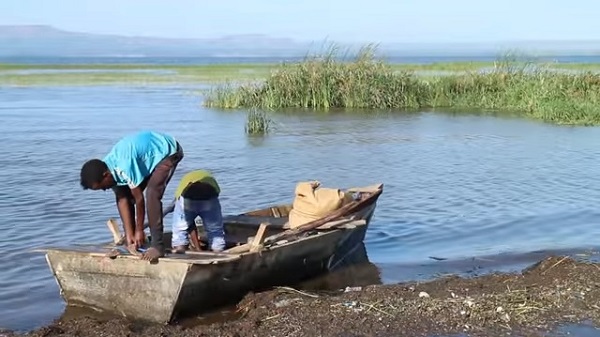
Overfishing at one of Ethiopia’s biggest lakes, Hawassa Lake, is threatening the future of aquaculture in a landlocked country that depends on its abundant number of lakes and rivers for fish.
By Addis Getachew (Anadolu Agency)
Very early in the morning, along the banks of Lake Hawassa in southern Ethiopia, pelicans swarm an enclosed area with their uniquely majestic poise, some hovering low, others walking beside pedestrians as if they have a common purpose: fish.
Young men holding small curved knives are everywhere, asking visitors if they want to have a taste of raw fish.
Numerous people flock to the area to start their busy days with fish served raw; they are addicts of the delicacy and they go straight to the fish-dissecting boys whom they know by name.
They gorge themselves on pieces of raw fish meat, dipping each slice in a hot chilly sauce called Koch-Kocha.
The pelicans, adept fishers, pick up the fish whole and swallow more than what their stomachs can carry, preserving the surplus in their pink throat bags.
Tourists flock to the lake to relax in a humid but soothing atmosphere.
“This is the only lake in the whole country where the fishes can be eaten raw; the meat is worm-free and tasty unlike those in other places,” says Dawit Abreham, chairman of the Hawassa Lake Fishers’ Association.
5,000 illegal nets
Overfishing at one of Ethiopia’s biggest lakes, Hawassa Lake, is threatening the future of aquaculture in a landlocked country that depends on its abundant number of lakes and rivers for fish.
ALSO READ: Ethiopia launches $170m scheme to develop livestock, fisheries sector
According to Dawit Abreham, overfishing and silt constituted the main reasons for dwindling amounts of fish in Hawassa Lake located 270 kilometers (nearly 168 miles) south of the capital Addis Ababa.
“My association has the legal permit to cast 750 nets across the lake to fish,” he said. “But there are about 5,000 illegal nets being cast on the lake.”
“Another reason for the dwindling fish resource is the fact that the lake is increasingly losing its depth.”
“Several decades ago, the depth of the lake went as far deep as 20 meters, which now got reduced to 14 meters due to silting,” he said.
Read the complete story at Anadolu Agency
